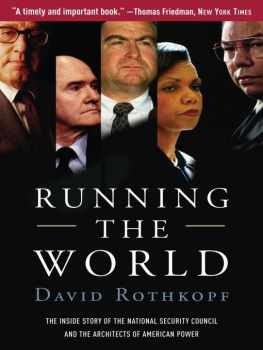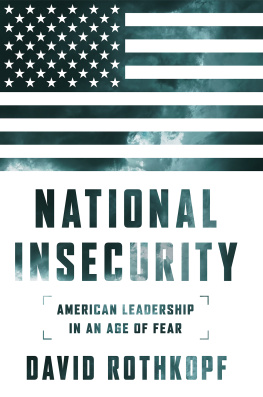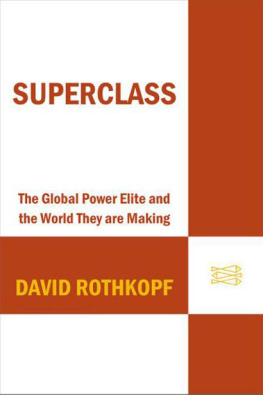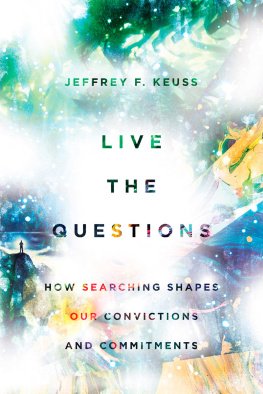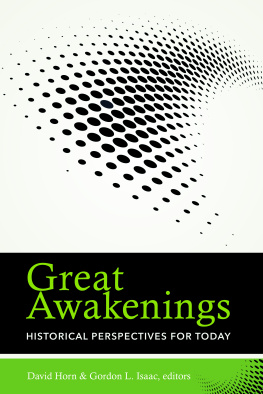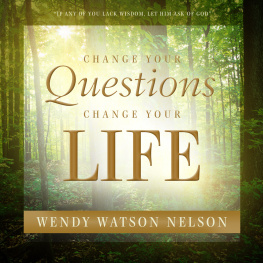Thank you for downloading this Simon & Schuster ebook.
Get a FREE ebook when you join our mailing list. Plus, get updates on new releases, deals, recommended reads, and more from Simon & Schuster. Click below to sign up and see terms and conditions.
CLICK HERE TO SIGN UP
Already a subscriber? Provide your email again so we can register this ebook and send you more of what you like to read. You will continue to receive exclusive offers in your inbox.
CONTENTS
This book is dedicated to Carla
And our never-ending conversation
Which regularly explores great questions and Constantly reminds me
She is the answer to many of the most important ones
INTRODUCTION
If I had an hour to solve a problem and my life depended on it, I would use the first fifty-five minutes determining the proper question to ask, for once I know the proper question, I could solve the problem in less than five minutes.
Attributed to Albert Einstein
When I was seventeen years old, I watched a documentary on nuclear winter that described the imagined aftermath of World War III . Hundreds of millions were dead. Hundreds of millions more were displaced or starving or slowly dying of radiation poisoning.
The summer day on which I was presented with all this was especially beautiful. Nonetheless, the film had left me in a kind of fog, shocked by the enormity of what seemed a plausibly imminent and horrific future for all mankind. Catastrophe palpably loomed even for leafy, green Summit, New Jersey, prosperous, oblivious, and bathed in sunshine as it was. I went looking for my father.
My father was a scientist. He had come to the United States in 1939 at the age of thirteen. He and his parents left one step ahead of the Nazis. Almost all the rest of our immediate family, almost three dozen people, were lost to the senseless horrors of the Holocaust. Five years after my father arrived he was in the US Army on his way back to Europe. There, he would command artillery batteries, and later embark on a journey to find the traces of lost relatives amid the desolation of the recently liberated concentration camps.
You would have thought that enduring such horrorgrowing up in fear in Nazi-controlled Austria, seeing his father dragged off on Kristallnacht, fighting in the bloodiest war in the history of mankind, adjusting to life after loss and dislocation in a new and unfamiliar countrywould have produced a certain grimness in my father, perhaps even pessimism. It did not. That does not mean that he forgot what had happened. Every year on the anniversary of Kristallnacht he would send my brother and sister and me reminders of the day. Right now, as I write this, the last handwritten note he ever sent mea postcard of Dachau, Germanyhangs taped to the wall over my desk. It reads November 10.
My father channeled his energies into science. Some people found solace in religion. Others found it in expressing their feelings or sense of alienation via the arts. He chose with each blow to become more rational, to turn not to God as limned in dogma and ritual but as manifested in nature. He sought understanding in facts, proofs, and algorithms. Specifically, he sought to understand how the human brain worked, how we learned. He asked questions. Constantly. Finding the right questions and seeking answers became his mission and, I believe, his own personal religion. His work brought him to perhaps the foremost scientific and technical research institution on earth at that time, the Murray Hill, New Jersey, headquarters of Bell Telephone Laboratories.
Bell Labs was a sprawling campus. In 1973, I had a summer job there. It was a world in which scientists were given free rein to do pure research, and the results in the nearly half century since the Labs were established had already proven to be transformational. Unlike other corporate labs or sponsored research in think tanks, this was a place that, in its heyday, was about creative minds being set free to first search for the most important questions, then for the best possible answers.
Bell Labs is where radar and telecommunications satellites were developed and where new frontiers in computing were explored. Perhaps its greatest accomplishment was the development of the transistor, an innovation designed to amplify long-distance calls that went much further in its applications, ushering in the information age by enabling the miniaturization of electronics and the establishment of the networks and the creation of computing power on which modern society relies.
Im sure that, back then, I hadnt the slightest idea of where the innovations that began at the Labs would lead, of the vast changes they would invite and demand of us all. Nor did I recognize the new questions that they would raise, or how they might tie into my contemplation of nuclear oblivion.
After searching for a bit, I found my father. If memory serves, I tracked him down at the swim club that many others from the Labs belonged to. He was by the tennis courtsa place typically dominated by a couple of fierce mathematicians with nasty groundstrokes and matching temperaments. As I approached him, he knew I was troubled by something. He was, after all, a psychologist. That said, when he asked what was wrong, I dont think he expected me to say that I was shaken by the looming prospect of global thermonuclear war. It just didnt seem like that kind of afternoon.
We sat down and I explained what I had seen. Hundreds of millions of people will die! I said, And it could happen. It could happen any minute. In fact, it probably will happen. The US and Russian militaries were on a hair-trigger setting. Missiles were waiting in their silos and onboard submarines lurking just off our shores and theirs.
He paused for a minute and then asked with a kind of contrarian perversity that I know he and many other scientists thought was wryly charming, I see. So, what is it that has you so upset?
This kind of curveball question had been thrown at me my whole life. But still it made my head spin. What do you mean, why am I so upset? The whole planet will be devastated. Hundreds of millions will die. Even if you survive, there will be no point in going on living.
He paused for a moment and stared out into the distance. Well, he said calmly and with a slight trace of a Viennese accent, you know, a hundred million peoplea third of the population of Europedied during the fourteenth century of bubonic plague. The result was the Renaissance.
The Renaissance represented a civilizational watershed. It produced changes of scope and profundity that touched every aspect of human lives. The nature of states and the rules that governed kings and kingdoms, their relationship with the Church, the fundamental tenets of religious belief, the nature of work and of economics, the nature of war and of peace, even the basic philosophies which societies embraced regarding the role of individuals, individual rights, the nature of the social contract, the very purpose of civilization would be rethought and changed forever. It was an upheaval that for Europe and, ultimately, the world, was epochal. How does the seemingly distant past, a time that for us is depicted only in the yellowing pages of books and in the cracked images of centuries-old frescoes, have any relevance in this era of virtual reality, big data, mapping the genome, and an entire world that seemingly has its eyes glued to glowing screens?
As was the case during the fourteenth century, we too are living in what might be described as the day before the Renaissance. An epochal change is coming, a transformational tsunami is on the horizon, and most of our leaders and many of us have our backs to it. Were looking in the wrong direction. Indeed, many of those in positions of power and their supporters are so actively trying to cling to the past we can almost hear their fingernails clawing at the earth as they try to avoid accepting the inevitable and momentous changes to come.


